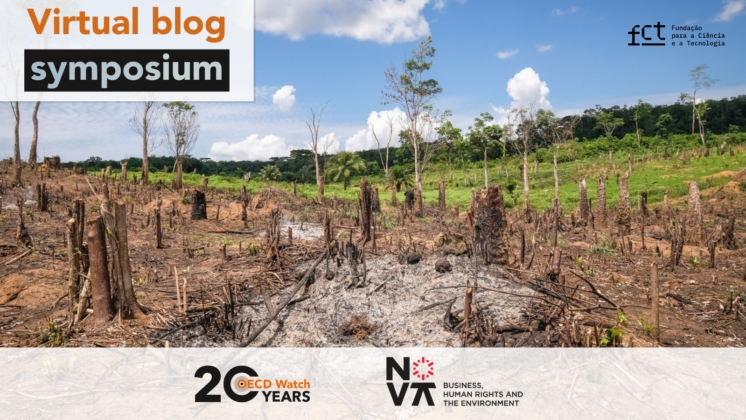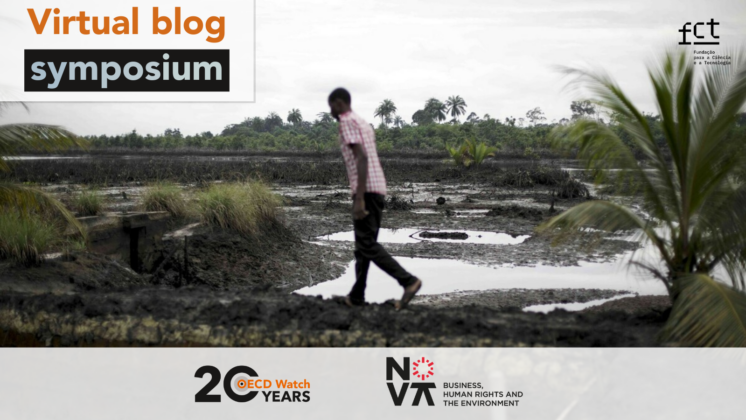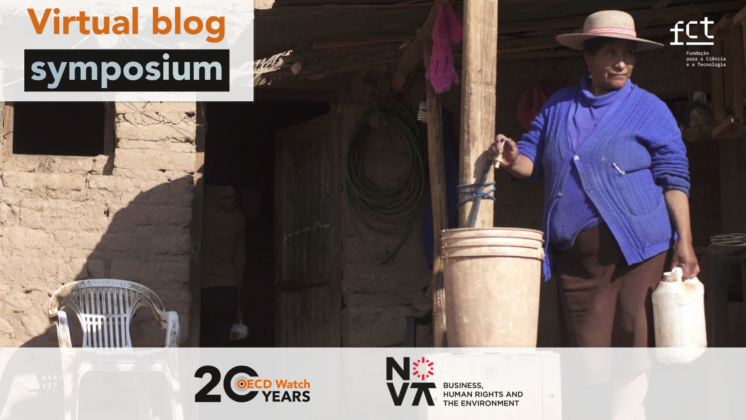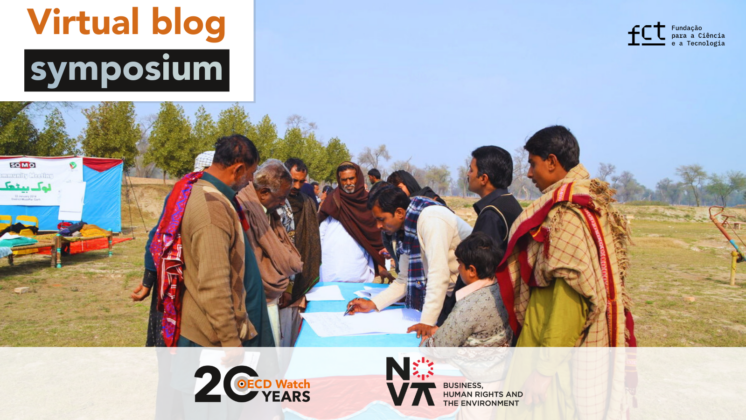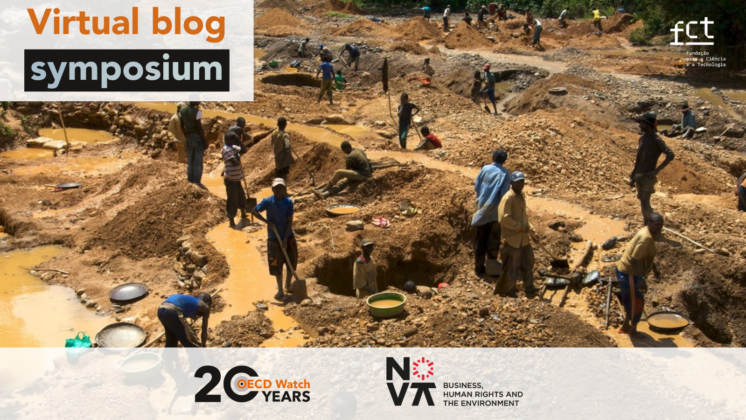By Janneke Bazelmans and Isabelle Geuskens
Blog symposium co-organised by OECD Watch and NOVA School of Law

In the midst of the climate crisis, urgent action is paramount. We are in a race against time, even more pressing than initially estimated by climate scientists. The most recent IPCC report reinforces this urgency, and the global forest fires and floods we are increasingly experiencing also underline the need for immediate, far-reaching and sustainable emissions reductions. In this context, the updated OECD Guidelines for Multinational Enterprises on Responsible Business Conduct 2023 align with a growing consensus that recognizes that business enterprises not only have responsibilities but also a pivotal role to play in addressing climate change while ensuring a Just Transition for all stakeholders. While this blog focuses on the latter, Just Transition, the updated text on climate change in the 2023 Guidelines was analysed by Chiara Macchi in her contribution for this blog symposium.
Just Transition in the OECD Guidelines 2023
While the term “Just Transition” wasn’t present in the 2011 OECD Guidelines, the 2023 Guidelines set new standards for the corporate contribution to a Just Transition. Referring to the Paris Agreement and taking into account the imperatives of a just transition, enterprises are now called upon to assess and address social impacts in the context of their environmental management and due diligence activities and to take action to prevent and mitigate such adverse impacts both in their transition away from environmentally harmful practices, as well as towards greener industries or practices, such as the use of renewable energy (Chapter VI, Environment, Commentary 70). Respecting labour rights, including engaging in social dialogue and collective bargaining, meaningfully engaging with relevant stakeholders and, where relevant, practicing responsible disengagement, will be important in this respect. Enterprises are also encouraged to provide training for up- or re-skilling of workers in anticipation of future changes in operations and employer needs, including societal and environmental changes linked to a Just Transition (Chapter V, Employment and Industrial Relations, Commentary 64).
Though it is important to see Just Transition included in the 2023 OECD Guidelines, the Guidelines still operate on a rather narrow definition of Just Transition, leaving several key justice dimensions unaddressed.
Below we analyze how the Just Transition provisions in the OECD Guidelines 2023 measure up against Just Transition principles that are increasingly being put forward by movements across the globe.
Addressing the roots of the problem
To address climate change, transitioning away from fossil to renewable energy is key. The IPCC and IEA are clear: no new fossil fuel development is possible if we are to limit warming to below 1.5 degrees, nor is it needed to meet growing energy demand. However, rapidly replacing dirty energy with clean energy is not enough. It is key that the transition from fossil to renewable energy is also ¨just¨, as the Paris Agreement underscores, and to which the revised OECD Guidelines refer. The Paris Agreement explicitly acknowledges “the imperatives of a just transition of the workforce and the creation of decent work and quality jobs in accordance with nationally defined development priorities¨.
However, since the Paris Agreement, the concept of what defines a Just Transition has been fiercely debated and has evolved.
The Paris Agreement’s definition of Just Transition originated from the labour movement and narrowly focused on employment. Today, however, the concept of Just Transition has considerably expanded. Advocates across the world underline that a Just Transition needs to address and comprise multiple justice dimensions. In particular, civil society advocates in the Global South highlight how climate change cannot be disconnected from multiple layers of interconnected injustices. Their perspectives stem directly from lived realities marked by historic and ongoing manifestations of systematic exploitation and oppression resulting in environmental degradation, human rights violations, (energy) poverty, conflict, corruption and impunity. Climate change is not an isolated phenomenon, but the culmination of an unequal and exploitative global system that has normalized the existence of zones of sacrifice around the world.
¨Fossil fuels are the driving force behind the climate catastrophe and are trapping the [African] continent in a climate emergency, leaving African people on the receiving end of the exploitative cycle of neocolonialism, profit maximization and exploitation¨ – Don´t Gas Africa
Just Transition advocates point to the need to stop fossil exploration and expansion. Don´t Gas Africa campaigners have raised the alarm on Africa becoming locked into a fossil future. They highlight that 48 out of the 55 African countries have ongoing fossil fuel expansion projects, mainly designed for exporting fossil to international markets. Many companies headquartered in the Global North are are rapidly fostering fossil dependencies in so-called newcomer or frontier countries, which currently have little or no oil and gas production, and often have abundant renewable energy potential, such as solar and wind power capacity[1]. These countries are already hit hard by climate change impacts and reliance on fossil extraction may increase their economic vulnerability due to the future risk of stranded assets and crippling debt. Moreover, these fossil developments and investments risk undermining their leapfrogging capacity to renewable energy, of which they often hold enormous potential.
Renewable energy can be a critical component of building a more just, sustainable, democratic and inclusive global future in countries that have been plagued for decades by energy poverty and economic hardship. But this potential can only be harvested when the transition is people-centred and decentralised via renewable energy systems that are accessible, affordable, reliable and sustainable for local populations. Moreover, this is only possible when territories are not once again made zones of sacrifice at the mercy of global powers seeking to control their renewable resources, markets and institutions for own benefits.
A Just Transition to renewable energy hence requires the unveiling and addressing of interconnected and deep-rooted systemic traps, which have held many so-called ¨developing¨ countries back for decades. Colonialism has forced many African countries into meeting the labour and material needs of Western industrialisation and development. This reality has persisted throughout post-colonial times; with energy crises, indebtedness and structural adjustment policies locking many African countries into ongoing economic dependency, fragility and exploitation. Many have become dependent on exporting their natural resources; making them vulnerable to resource curse impacts and economic shocks, as well as overly dependent on foreign industries, states, and their finance mechanisms.
With the rapid growing demand for critical transition metals and minerals to power the transition – of which many located in the Global South and on indigenous territories – there is a risk that many resource rich countries end up once again caught in the post-colonial trap of extractivist and low-value-added export economies. This reality, combined with debt burdens, constrains their sovereignty over their own natural resources and economic policies. Also, with patents and manufacturing capacity for renewable and other green technologies being mostly held in the Global North and China, this further obstructs them in developing, using, and deciding on their own green technologies, keeping them locked in a vicious cycle of economic dependency. If not addressed, the current system will simply reproduce a green energy framework that forces many to continue to live in material and energy poverty while facing the human rights and environmental costs. Recent research by Global Witness, studying several lithium projects in African countries, underscores this, warning that instead of renewable energy-related mineral supply chains benefiting producer nations, they risk embedding corruption, failing to develop local economies, while harming citizens and the environment.
¨We need to promote energy investments that meet the energy needs of consumers in Africa before seeking to satisfy wealthy nations’ demands. We need to promote energy systems that allow for all Africans to become producers of energy, rather than just consumers¨ – Don´t Gas Africa
Renewable energy therefore holds great potential, but this potential cannot be realized without a Just Transition that ensures that countries and communities can also benefit from the renewable energy resources they hold. A Just Transition approach by governments and companies hence consists of supporting industrial policies that support the sustainable development of local and national natural resources and human capacities, decent jobs, and expanding internal renewable energy industry capacities across the value chain, in order to empower local resource control and production capacities. According to the Business and Human Rights Resource Centre, for a Just Transition to take place, government and businesses should commit to exploring policy frameworks supporting consent and shared asset models between companies and communities impacted by transition mineral mining and renewable energy projects.
It also requires industrialized countries addressing their resource consumption and reducing their material footprint. This can be done by prioritizing circular economy solutions to prevent resource depletion and minimizing disposable consumption and private transportation in favour of equitable access to services and low-carbon public transit.
Without addressing these deep-rooted inequalities, the transition cannot be called ¨just¨, as it likely will further consolidate and increase social inequalities, exclusion, environmental degradation, human rights violations, and social unrest and conflict.
Conclusion and recommendations
While the 2023 OECD Guidelines represent progress in corporate responsibility to ensure a Just Transition, they still refer to the narrow definition of Just Transition in the Paris Agreement, leaving out several key justice dimensions essential to a truly fair Just Transition. To bridge this gap, we make several recommendations to the OECD, governments, and companies. We recommend for the OECD to develop further guidance – which could be part of a climate due diligence guidance similar to the OECD’s existing sectoral guidances – reflecting the comprehensive principles of a Just Transition described above. All governments, OECD members or otherwise, should also align their laws and policies aimed at supporting businesses in the renewable energy sector with these Just Transition principles. This extends to the European Green Deal and its green oath of ‘do no harm’, which requires that all actions and policies of the European Union achieve a successful and just transition towards a sustainable future.
As well as ensuring that all companies fully align with human rights and social and environmental standards, including the new standards in the OECD Guidelines 2023, it is important for governments as well as companies to demonstrate that their involvement in renewable or green activities do not undermine a Just Transition in the countries where their activities take place. All such activities, including the halting of new fossil exploration and expansion, should meet the principles of a fair and Just Transition promulgated by civil society advocates.
[1]GOGEL, a public database that provides a detailed breakdown of the activities of oil and gas companies worldwide, recently published that 96% of the 700 upstream companies on its database are still exploring or developing new oil and gas fields. For example, TotalEnergies (which tops the list of companies expanding in the highest number of countries) is exploring and developing new oil and gas resources in countries such as South Africa, Namibia, Mozambique and Papua New Guinea.
About the authors
 Janneke Bazelmans works as a legal expert on Business and Human Rights, Environment & Climate and is part of the climate litigation team at Friends of the Earth Netherlands/Milieudefensie. She has published several articles on climate due diligence and on responsible business conduct legislation.
Janneke Bazelmans works as a legal expert on Business and Human Rights, Environment & Climate and is part of the climate litigation team at Friends of the Earth Netherlands/Milieudefensie. She has published several articles on climate due diligence and on responsible business conduct legislation.
 Isabelle Geuskens works as Just Energy Transition (JET) Senior Officer at Friends of the Earth Netherlands/ Milieudefensie. Together with global partners, the JET work focuses on achieving fossil restrictions at policy level – in particular public finance – and advocating for the integration of Just Transition principles in renewable energy policies and finance.
Isabelle Geuskens works as Just Energy Transition (JET) Senior Officer at Friends of the Earth Netherlands/ Milieudefensie. Together with global partners, the JET work focuses on achieving fossil restrictions at policy level – in particular public finance – and advocating for the integration of Just Transition principles in renewable energy policies and finance.
About the blog symposium
2023 is a momentous year in the corporate accountability world. In June, not only did the OECD adopt key revisions to the newly renamed OECD Guidelines for Multinational Enterprises on Responsible Business Conduct, but the European Parliament also agreed on its position on the proposed directive on corporate sustainability due diligence. In recognition of these important events, NOVA BHRE and OECD Watch are co-hosting a blog symposium in October and November 2023 focused on the updated OECD Guidelines in the context of the current corporate accountability landscape.
The views and opinions expressed in this blog represent the views of the author and does not necessarily represent those of OECD Watch or NOVA School of Law.


